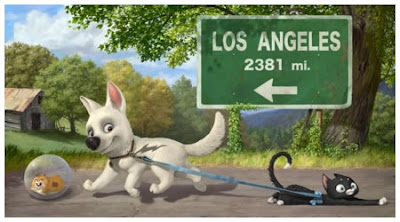
There is a long and storied tradition of animated films which take great works of drama and literature and adapt them for children, generally by turning the main characters into adorable animals. The Lion King is Hamlet, only with lions and some characters live at the end. The Jungle Book is the Jungle book only with singing. The list goes on and on. Into this crowded but noble arena steps the latest contender, Bolt, a film which breaks new ground by being an adaptation of two different works of literature.
Bolt takes it structure from Homer's famous epic, The Odyssey. As we all learned in Mr. Bosch's ninth grade English class, The Odyssey is the story of Odysseus, a brave Greek hero who finds himself far from home and uses only his wits to overcome all manner of monsters and gods so he can return home to his loving wife. In the film, the Odysseus character is Bolt (John Travolta), a dog who plays a really kickass super dog on TV. However, when Bolt ends up somewhere other than the TV set, he discovers that he does not possess any of the powers he thought he did and instead must rely only on his wits (see the connection?) and a few friends (who end up getting eaten by Charybdis in the second act) in order to get home to his true love, Some Girl (Miley Cyrus).
While Bolt uses the narrative arc of the hero's journey, its emotional heart is taken straight out of Nabokov's famous novel Lolita. For those unfamiliar (we didn't read it in Bosch's class, so you're excused), Lolita is a tale of unrequited love between an older man and a far-too-young girl. Though John Travolta and Miley Cyrus fit neatly into these roles, the creators of Bolt wisely decided that, in this era of Ashton-Demi and Alanis-Uncle Joey, a February-October romance just doesn't have the same edge it did in Nabokov's time. You gotta hand it to Disney: beastility is the new statutory rape and they totally called it first.
I could go on and on about Bolt's myriad literary allusions--its reinterpretation of Hegel's Master-Slave dialectic in the the third act is particularly clever--but this is a movie review, not literature class. What really matter is how well this movie compares to Wall-E. And frankly, it's just not even the same league. Wall-E was a pleasant but ultimately cold movie, with some good laughs but little to say. Bolt, on the other hand, takes many of the seminal works of the English canon and reinterprets them in a way that is understandable and meaningful to kids, adults, and even dogs. So bring Fido along, because this isn't just Lolita with heart, it's also a whole lot of fun.

No comments:
Post a Comment